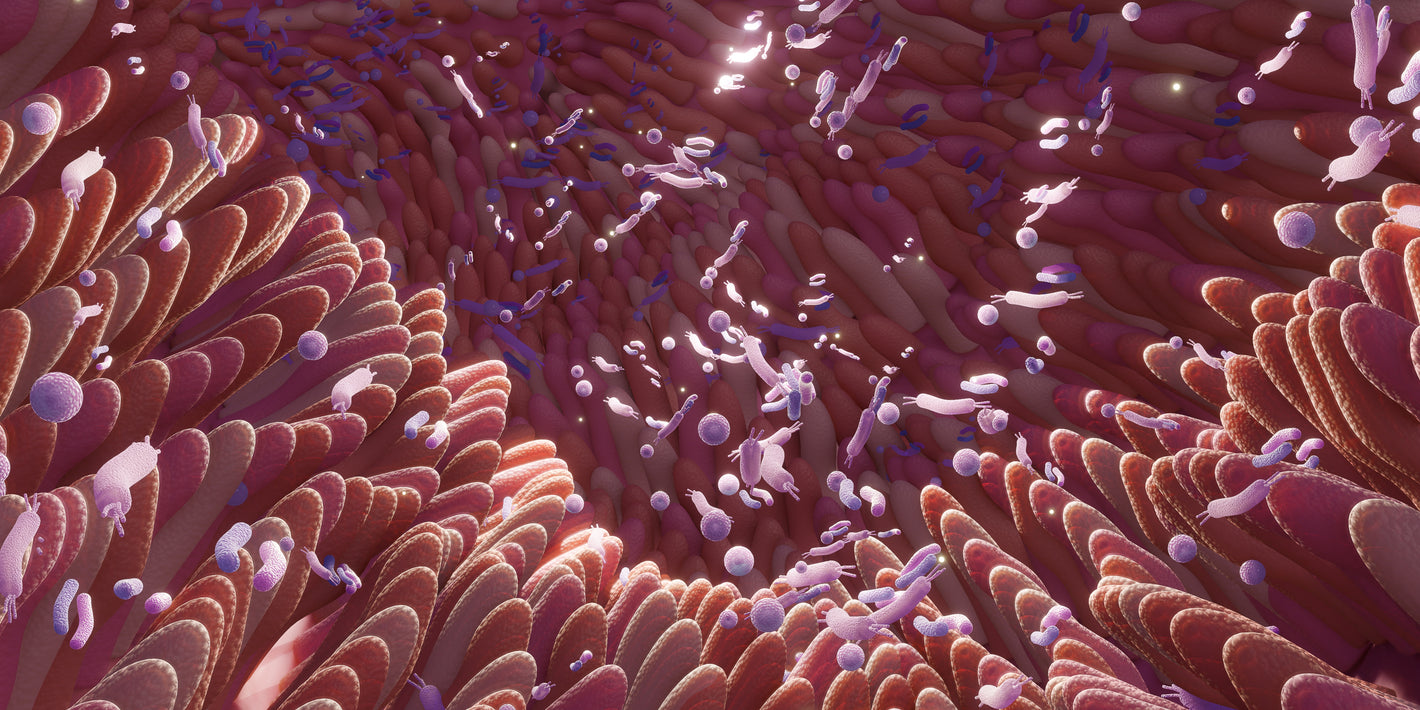
How Prebiotics Elevate Gut Health
Introduction to Prebiotics
When it comes to digestive health, prebiotics are a term you've likely heard but may not fully understand. Contrary to probiotics, which are live beneficial bacteria, prebiotics are non-digestible fibres that serve as food for these good bacteria. Found naturally in certain foods and available in supplemental form, prebiotics provide nourishment for beneficial gut flora, thereby supporting a healthy digestive ecosystem.
Prebiotics are most commonly found in fibrous fruits, vegetables, and grains like garlic, onions, bananas, and oats. They can also be found in fermented foods and as over-the-counter supplements. The fibre found in prebiotic-rich foods resists digestion in the upper gastrointestinal tract, reaching the colon where it fuels the growth of beneficial bacteria.
Although research on prebiotics is still evolving, these fibres have been associated with numerous health benefits that extend beyond the gut. The reason prebiotics are essential can be traced back to their interaction with the gut microbiome, which is the community of microorganisms residing in our digestive system.
Understanding prebiotics also involves acknowledging that they are not a one-size-fits-all solution. The impact of prebiotics can vary based on the individual's existing gut health, dietary patterns, and medical conditions. This calls for a nuanced approach when considering prebiotics as part of a wellness strategy.
Lastly, it's important to mention that while prebiotics have potential health benefits, they should not be considered as a standalone treatment for medical conditions. Instead, they should complement a balanced diet and a healthy lifestyle.
The Gut Microbiome and Its Significance
The gut microbiome is a complex community of bacteria, viruses, and other microorganisms that inhabit the gastrointestinal tract. Over the past decade, research has shown that the gut microbiome plays a significant role in not just digestive health but overall well-being. A balanced microbiome is associated with a healthy immune system, efficient nutrient absorption, and even mental health.
However, the gut microbiome is incredibly sensitive to lifestyle factors such as diet, stress, and medication. An imbalance in gut flora, termed dysbiosis, is linked to numerous health issues, including digestive disorders, obesity, and even mental health conditions like anxiety and depression.
In addition, the gut microbiome is unique to each individual. Factors such as genetics, early life exposure to microorganisms, and long-term dietary habits contribute to the composition of one's gut flora. This makes personalised medicine and nutrition an emerging field aiming to tailor treatments and diets based on individual gut microbiomes.
One of the challenges in studying the gut microbiome is its complexity and variability. Researchers are still working to understand the specific roles of different bacterial strains and how they interact with each other and with their host—us.
Given its role in overall health, maintaining a balanced gut microbiome is of utmost importance. This is where prebiotics come into the picture. As food for beneficial bacteria, prebiotics help sustain a balanced microbiome, thereby supporting a wide range of health outcomes.
Prebiotics as Gut Microbiome Nourishment
Prebiotics are an essential aspect of nourishing and balancing the gut microbiome. They specifically target beneficial bacteria, helping them flourish and exert their health-boosting effects. Prebiotic fibres undergo fermentation in the colon, producing short-chain fatty acids (SCFAs) like acetate, propionate, and butyrate, which have their own health benefits.
SCFAs play a crucial role in maintaining the integrity of the gut lining, serving as an energy source for colon cells and aiding in nutrient absorption. They also help regulate pH levels, which inhibits the growth of harmful bacteria. Essentially, prebiotics help create an environment where beneficial bacteria can thrive.
However, introducing prebiotics into one’s diet is not without challenges. For individuals with certain digestive disorders like Irritable Bowel Syndrome (IBS), high amounts of prebiotic fibres may exacerbate symptoms like gas and bloating. It's essential to approach prebiotic supplementation cautiously and consult with a healthcare provider for personalised advice.
Additionally, since prebiotics feed all gut bacteria, there is ongoing research to understand the potential risks of overstimulating harmful bacterial strains. However, current evidence suggests that the benefits of fostering beneficial bacteria generally outweigh the risks.
The most effective approach to prebiotic consumption may be to incorporate them gradually into your diet. This allows your gut microbiome to adjust and minimises digestive discomfort. Furthermore, diversity in prebiotic sources is recommended for a balanced gut microbiome.
Enhancing Digestive Function
One of the primary roles of prebiotics is to improve digestive health. They help in the efficient breakdown of food, improve bowel regularity, and promote a healthy gut lining. Consuming a diet rich in prebiotics can improve stool quality, reduce constipation, and manage diarrhoea.
In addition, the SCFAs produced through the fermentation of prebiotics have been shown to regulate intestinal motility, which helps move food through the digestive tract efficiently. This is particularly beneficial for individuals with slow or irregular bowel movements.
However, achieving these digestive benefits may involve a balancing act. Some individuals may experience digestive discomfort when initially introducing prebiotics into their diet. This is usually temporary and can be managed by adjusting the dosage or taking prebiotics alongside other foods.
Moreover, while prebiotics can improve digestive function, they are not a cure-all. For individuals with underlying gastrointestinal diseases or disorders, additional medical interventions may be required. Prebiotics should be part of a broader strategy for digestive health, which could include other dietary changes, medications, or even surgical treatments for severe cases.
It’s also worth mentioning that while prebiotics may offer general digestive benefits, their effectiveness can vary from person to person due to the unique nature of each individual's gut microbiome. Therefore, it may take some experimentation to identify which prebiotic sources yield the best results for you.
Balancing Gut Microbiota
The concept of "gut balance" is a bit elusive but generally refers to a gut microbiome where beneficial bacteria outnumber or neutralise harmful bacteria. Prebiotics can promote such balance by selectively fostering the growth of beneficial bacteria, such as Lactobacilli and Bifidobacteria, which in turn inhibit the growth of harmful microorganisms.
However, achieving this balance is not as simple as merely consuming prebiotics. The gut microbiome is influenced by a wide array of factors, including other aspects of diet, lifestyle, stress, and medications like antibiotics. Therefore, while prebiotics are beneficial, they are only one piece of a larger puzzle.
One challenge in achieving a balanced gut microbiota through prebiotics is the risk of overconsumption. Excessive prebiotic intake may lead to digestive issues, such as bloating, gas, and discomfort, particularly in sensitive individuals or those with pre-existing gastrointestinal conditions.
Another challenge lies in the need for personalised recommendations. Because each individual’s gut microbiota is unique, the effects of prebiotics can vary significantly. Ongoing research in the field of personalised nutrition and microbiome testing aims to address this by providing tailored dietary recommendations based on one’s specific gut flora.
Prebiotics and Weight Management

Emerging research suggests that prebiotics may play a role in weight management by modulating the gut microbiome. Certain strains of beneficial bacteria may help regulate body weight by affecting hormones related to hunger and satiety, improving insulin sensitivity, and even reducing fat storage. Prebiotics help to support the growth of these beneficial bacteria, potentially making them a helpful tool in weight management strategies.
However, it's crucial to remember that weight management is a multifaceted issue. Relying solely on prebiotics would likely not yield significant long-term results. They should be a component of a broader weight management strategy that includes regular physical activity and a balanced, calorie-controlled diet.
A potential trade-off to consider is that while prebiotics themselves are low in calories, the foods that contain them may be quite calorie-dense. For example, avocados are a source of prebiotic fibre but are also high in healthy fats and calories. Balancing the benefits of prebiotic foods with their caloric content is vital for effective weight management.
Additionally, more research is needed to understand the relationship between prebiotics and weight management fully. While initial studies are promising, the long-term effects of prebiotics on weight remain an active area of research.
Lastly, individuals with eating disorders or other medical conditions affecting weight should consult a healthcare provider before making significant changes to their diet, including prebiotic supplementation.
Enhancing Nutrient Absorption
Prebiotics can enhance nutrient absorption in the gut. They support a healthy intestinal lining and regulate pH levels, creating an environment conducive to nutrient absorption. This can be particularly beneficial for essential nutrients like calcium, magnesium, and possibly some antioxidants.
However, it's important to note that while prebiotics can improve nutrient absorption, they are not a substitute for a balanced diet rich in essential nutrients. For those with specific nutrient deficiencies or malabsorption issues, additional treatments or supplements may be required.
Moreover, the role of prebiotics in enhancing nutrient absorption could vary depending on other dietary factors. For example, some nutrients may require certain co-factors for optimal absorption, and these might not be influenced by prebiotics. Understanding these complexities necessitates a comprehensive approach to diet and nutrition.
One challenge here lies in determining the right types and amounts of prebiotics to optimise nutrient absorption. Research is still ongoing, and it's unclear if certain prebiotics are more effective than others in this regard. The current recommendation is to include a variety of prebiotic-rich foods in your diet to maximise potential benefits.
Reducing Inflammation
Several studies indicate that prebiotics can help reduce systemic inflammation, which is linked to numerous chronic diseases, including heart disease, diabetes, and cancer. By promoting a balanced gut microbiome and producing anti-inflammatory SCFAs during fermentation, prebiotics may help modulate the body's inflammatory response.
However, it's worth mentioning that while reducing inflammation is generally considered beneficial, some level of inflammation is necessary for the body's healing processes. As such, it's essential to take a balanced approach and not view prebiotics as a panacea for all inflammatory conditions.
Furthermore, individuals with certain inflammatory conditions, such as Crohn's disease or ulcerative colitis, should consult with a healthcare provider before incorporating prebiotics into their diet, as these could potentially exacerbate symptoms.
Promoting a Stronger Immune System
The gut is a critical component of the immune system, housing approximately 70% of the body’s immune cells. By fostering a balanced gut microbiome, prebiotics may contribute to a more robust immune response. Some research suggests that prebiotics can enhance the production of antimicrobial substances and improve the body's resistance to infections and pathogens.
Nevertheless, the relationship between the gut microbiome and the immune system is complex and not fully understood. Prebiotics can support immune health but are not a substitute for a well-rounded diet, regular exercise, and other lifestyle factors that contribute to a robust immune system.
Supporting Mental Well-Being
Emerging evidence suggests a strong connection between the gut and the brain, often referred to as the gut-brain axis. Through this connection, the state of the gut microbiome may influence mental health conditions like anxiety, depression, and stress. Prebiotics, by promoting a balanced gut microbiome, may play a role in mental well-being.
However, while these findings are promising, they are not definitive. Mental health is a complex interplay of multiple factors, including genetics, environment, and lifestyle. Prebiotics should not be considered a standalone treatment for mental health conditions but rather as part of a comprehensive approach that may include medication, therapy, and other lifestyle interventions.
Summary
Introduction to Prebiotics- Non-digestible fibres that nourish beneficial gut bacteria.
- Found in fibrous fruits, vegetables, grains, and supplements.
- Support a healthy digestive ecosystem by fueling beneficial bacteria.
- Associated with various health benefits beyond the gut.
- Not a one-size-fits-all solution; impact varies per individual.
- Should complement a balanced diet and healthy lifestyle, not replace treatments.
- A complex community of microorganisms influencing overall well-being.
- Affects digestive health, immune system, nutrient absorption, and mental health.
- Sensitive to diet, stress, and medication.
- Unique to each individual and influenced by genetics and dietary habits.
- Research is ongoing to understand the specific roles of different bacterial strains.
- Target beneficial bacteria, aiding their growth and health-boosting effects.
- Ferment in the colon, producing short-chain fatty acids (SCFAs) with health benefits.
- SCFAs maintain gut lining integrity, aid nutrient absorption, and regulate pH levels.
- May cause digestive discomfort in certain individuals or those with IBS.
- Improve breakdown of food, bowel regularity, and gut lining health.
- Can improve stool quality and manage constipation and diarrhoea.
- SCFAs regulate intestinal motility, aiding food movement through the digestive tract.
- Promote a balance where beneficial bacteria neutralise harmful bacteria.
- Achieving balance involves considering other factors like diet, stress, and medication.
- Overconsumption of prebiotics may lead to digestive issues.
- May modulate the gut microbiome to regulate body weight.
- Should be part of a broader weight management strategy.
- More research needed to fully understand the relationship between prebiotics and weight.
- Support a healthy intestinal lining and regulate pH levels, aiding nutrient absorption.
- Not a substitute for a balanced diet rich in essential nutrients.
- Can help reduce systemic inflammation, linked to numerous chronic diseases.
- Support a robust immune response by fostering a balanced gut microbiome.
- May influence mental health conditions through the gut-brain axis.
Prebiotic Information
For everything you need to know about prebiotics and prebiotic supplements, check out our comprehensive information page here.
Prebiotic
Biosphere Nutrition’s Prebiotic Powder is a unique blend of Sunfiber® and Black Elderberry Extract, designed to nurture gut health and support the immune system. This easy-to-mix, great-tasting formula ensures optimal absorption and digestive comfort. To learn more about our Prebiotic, check out the product page here.







